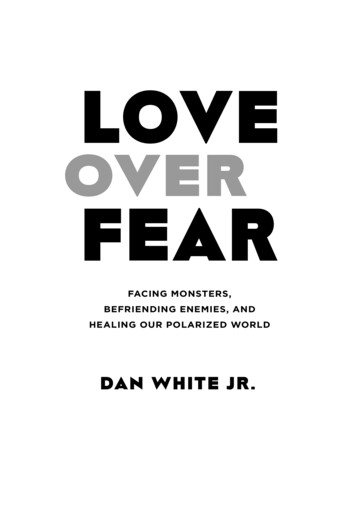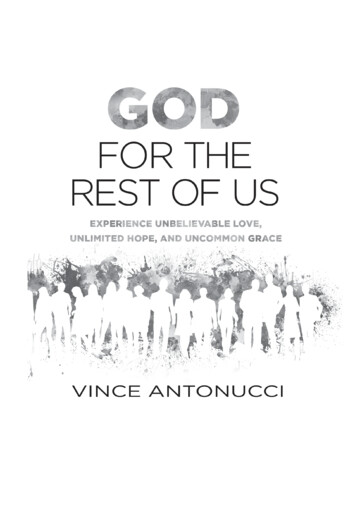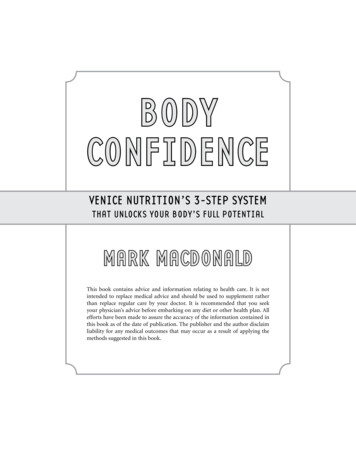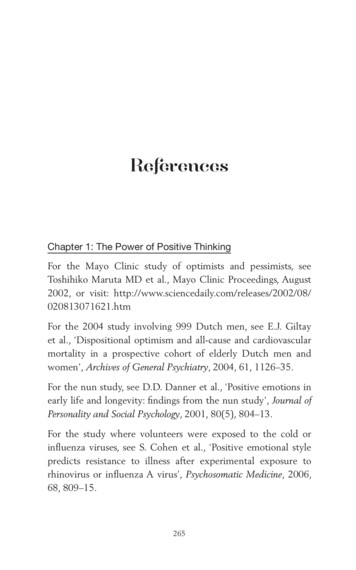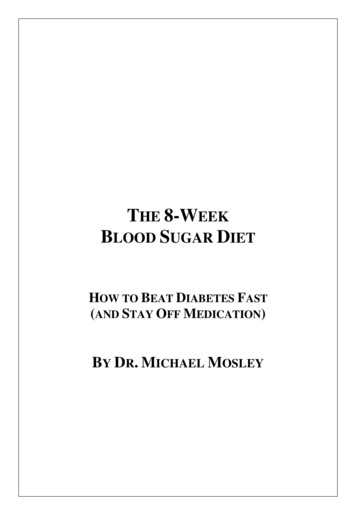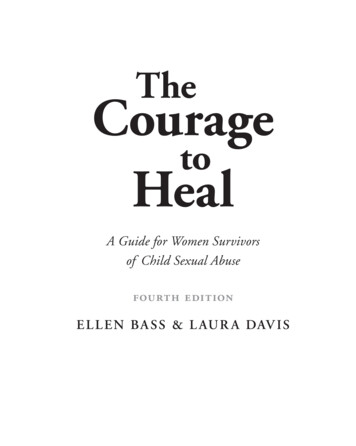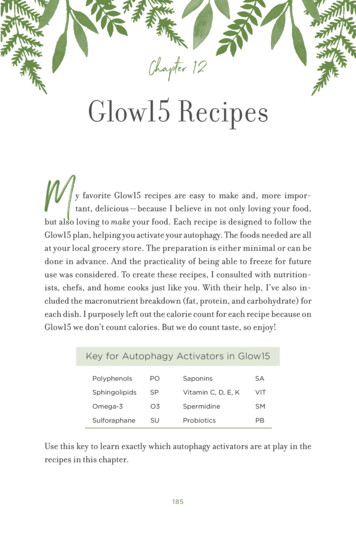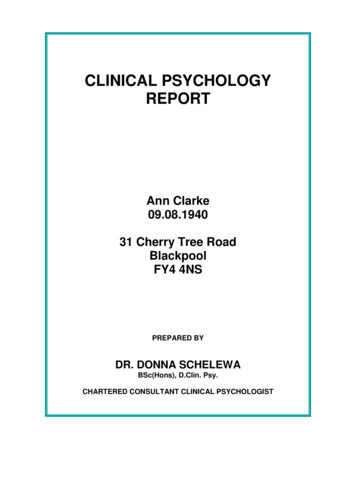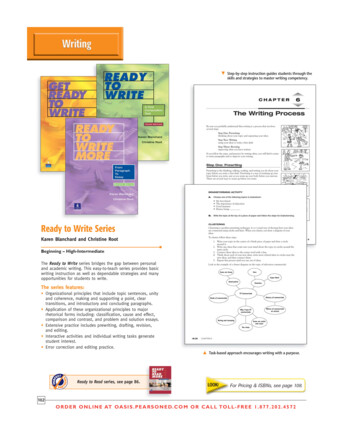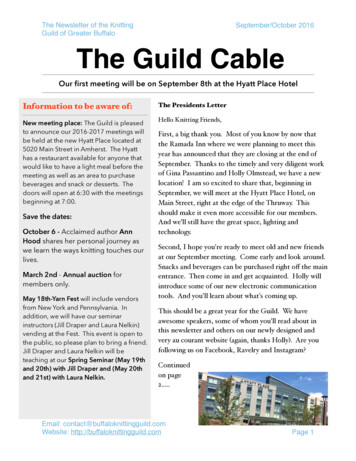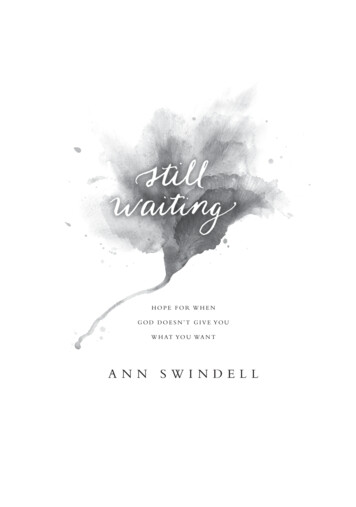
Transcription
HOPE FOR WHENG O D D O E S N ’ T G I V E YO UW H AT YO U WA N TANN SWINDELLThe nonfiction imprint ofTyndale House Publishers, Inc.
NOTESC H A P T E R 1: W H E N WA I T I N G M A K E S Y O U B RO K E N1. “Trichotillomania Statistics: The Numbers behind Hair Pulling Disorder,”TrichStop, accessed November 7, 1016, http://www.trichstop.com/info / general/trich-statistics.2. Samuel R. Chamberlain, Lara Menzies, Barbara J. Sahakian, and Naomi A.Fineberg, “Lifting the Veil on Trichotillomania,” The American Journal ofPsychiatry 164, no. 4 (April 2007): 568–74, http://ajp.psychiatryonline.org / doi/full/10.1176/ajp.2007.164.4.568.C H A P T E R 2: W H E N WA I T I N G M A K E S Y O U W E A K1. C. S. Lewis, The Weight of Glory (New York: HarperOne, 2001), 37.2. Harvey Simon, ed., “Anemia,” University of Maryland Medical Center, lastreviewed March 18, 2013, http://umm.edu/health/medical/reports/articles / anemia.3. Michelle Wright and Colin Tidy, “Iron-Deficient Anaemia,” Patient.info,last reviewed November 24, 2014, http://www.patient.co.uk/doctor / iron -deficiency-anaemia-pro.4. “Lexicon: Strong’s G769: Astheneia,” Blue Letter Bible, https://www ngs G769&t ESV.5. Ibid.C H A P T E R 3: W H E N WA I T I N G C O S T S Y O U E V E RY T H I N G1. See David Instone-Brewer, “Choosing a Legal System in Early aff/Instone-Brewer/LegalSystems .htm, for more information regarding dowries in Jewish culture. Articleforthcoming in Review of Rabbinic Judaism: Ancient, Medieval, and Modern,http://booksandjournals.brillonline.com.2 31
S T I L L WA I T I N GC H A P T E R 4: W H E N WA I T I N G C L A I M S Y O U R I D E N T I T Y1. R. C. H. Lenski, The Interpretation of St. Mark’s Gospel (Minneapolis:Augsburg Fortress, 2008), 220–21.2. Darrell L. Bock, Luke, The IVP New Testament Commentary Series(Downers Grove, IL: InterVarsity Press, 1994), 159.3. Ibid.4. William L. Lane, The Gospel of Mark, 2nd ed., The New InternationalCommentary on the New Testament (Grand Rapids, MI: Eerdmans,1974), 191.5. Bock, Luke, 159.6. C. S. Lewis, The Weight of Glory (New York: HarperOne, 2001), 42.C H A P T E R 5: W H E N WA I T I N G F E E L S O F F E N S I V E1. Elisabeth Elliot, Passion and Purity (Grand Rapids, MI: Revell, 2002), 89.2. Elisabeth Elliot, Quest for Love (Grand Rapids, MI: Revell, 2002), 133–34.3. James R. Edwards, The Gospel according to Mark, The Pillar New TestamentCommentary (Grand Rapids, MI: Eerdmans, 2002), 163.4. Ibid.C H A P T E R 6: W H E N WA I T I N G B R I N G S Y O U S H A M E1. Steven Phillipson and Christopher Gibson, “Hair Pulling a.k.a.,Trichotillomania: A Simple Habit or a Complex Diagnosis?” Center forCognitive-Behavioral Psychotherapy, OCD Online, accessed September 9,2016, http://www.ocdonline.com/trichotilomania.2. James R. Edwards, The Gospel according to Mark, The Pillar New TestamentCommentary (Grand Rapids, MI: Eerdmans, 2002), 163.3. Samuel R. Chamberlain, Lara Menzies, Barbara J. Sahakian, and Naomi A.Fineberg, “Lifting the Veil on Trichotillomania,” The American Journal ofPsychiatry 164, no. 4 (April 2007): 568–74, http://ajp.psychiatryonline.org / doi/full/10.1176/ajp.2007.164.4.568.C H A P T E R 7: W H E N WA I T I N G F E E L S L I K E S U F F E R I N G1. Hugh Grubb, “Recovering from the Trauma of Trichotillomania,”Trichotillomania Learning Center Newsletter, 1997.2. “About Masiphumelele,” Masicorp, accessed November 4, 2016, http://www .masicorp.org/aboutmasiphumelele.html. See also “Masiphumelele,” LivingHope, accessed November 4, 2016, http://www.livinghope.co.za/about / communities/masiphumelele.C H A P T E R 8: W H E N WA I T I N G I S R I S K Y1. Gary M. Burge, Encounters with Jesus (Grand Rapids, MI: Zondervan,2010), 6.2 32
ANN SWINDELL2. Ibid., 47.3. See Genesis 22; Daniel 3; 6; Esther 4–5; Luke 1; Matthew 1; 9; 27.4. Bruce J. Malina and Jerome H. Neyrey, “Honor and Shame in Luke-Acts:Pivotol Values of the Mediterranean World,” in The Social World of Luke-Acts:Models for Interpretation, ed. Jerome H. Neyrey (Peabody, MA: Hendrickson,1991), 42.5. Burge, Encounters, 48.6. John Piper, Risk Is Right: Better to Lose Your Life Than to Waste It (Wheaton, IL:Crossway, 2013), 19.7. Ibid., 20.C H A P T E R 9: WA I T I N G W I T H G R AC E1. Gary M. Burge, Encounters with Jesus (Grand Rapids, MI: Zondervan,2010), 53.C H A P T E R 10: H O PE F O R T H E WA I T I N G O N E S1. Gary M. Burge, Encounters with Jesus (Grand Rapids, MI: Zondervan,2010), 48.2 33
DISCUSSION QUESTIONSChapter 1: When Waiting Makes You Broken1. The Bleeding Woman experienced a major—andunwanted—change in her life when she startedbleeding. Have you experienced any changes in yourlife (large or small) that were unwanted or difficult?How have those changes affected the course ofyour life?2. Ann’s struggle with trichotillomania forced her tostart coming to terms with her own brokennessbecause she couldn’t do anything to fix it. Whatare you waiting for God to heal, fix, or renew inyour life?3. Are there any good sides to brokenness? How mightthe brokenness you feel be a gateway to knowingGod’s love in a new way?4. Moving forward: Spend some time in prayer,asking God to show you his love through yourbrokenness.2 35
S T I L L WA I T I N GChapter 2: When Waiting Makes You Weak1. Ann shares that, with trich, she often felt that sheshould “try harder” and be able to “get it together.”Have you ever felt weak in the one area you wantedto be strong? What happened?2. The Bible says that God’s power is made perfect inour weakness (see 2 Corinthians 12:9). What do youthink this verse means?3. Ann writes, “The ways I fail and the ways I don’tmeasure up actually act as a vehicle to meeting Jesusin my daily life” (page 42). In what ways have youseen God work in the weak areas of your life or thelives of those you love?4. Moving forward: Write down the places in your lifethat feel weak, and ask Jesus to show you how thoseplaces provide an opportunity to meet with him ina deeper way. Take note of how he meets you in thecoming days.Chapter 3: When Waiting Costs You Everything1. The Bleeding Woman spent all her money seekinghealing. Have you ever spent a lot of money, time,or energy trying to fix an area of brokenness in yourlife? Did it work?2. Ann shares that hiding trichotillomania fromher friends cost her a great deal in terms of time,energy, and friendship. Have you ever tried to hidea weakness from those closest to you? What did itcost you?236
ANN SWINDELL3. We can rest in knowing that Jesus has already paidthe highest price for our struggles through his deathon the cross (see 1 Peter 1:18-21). What would itlook like to admit our inability to be self-sufficient(see page 60) and invite the Lord into our weaknessand waiting? How might our lives—and ourfriendships—be transformed?4. Moving forward: Read 2 Corinthians 3:4-5 out loud,and then thank the Lord that “our sufficiency isfrom God,” not from ourselves. Pray for the grace torely on him this week.Chapter 4: When Waiting Claims Your Identity1. Ann writes about how she always wanted to beidentified as “beautiful.” How do you long to beidentified?2. One of the reasons Ann struggled with her weaknesswas because “it slithered into [her] identity”(page 69). Are there any areas in your life where youidentify yourself by your struggle, your sin, or whatyou lack?3. In Christ we have a new identity that is determinednot by our brokenness or sinfulness but by his love.What practical steps can you take this week to focusyour heart and mind on how Christ identifies you?4. Moving forward: Write out one or two verses thatdeclare your identity in Christ (Ephesians 2:10 and1 Peter 2:9 are great places to start). Read them everyday, reminding yourself of who you truly are.2 37
S T I L L WA I T I N GChapter 5: When Waiting Feels Offensive1. When God says no to what we want, it’s easy to takeoffense. Are there any places in your life where youare feeling offended by God? What prompted thosefeelings?2. The Bleeding Woman kept her heart tender towardGod because she clung to hope. In what area of yourlife do you need more hope in God’s love for you?3. What’s the difference between being honest withGod and being offended by him? What can you doto remain tethered to God when you’re on the brinkof offense?4. Moving forward: Make a list of times in your lifewhen you have felt offense toward God, and ask himto forgive you. Tear the paper into pieces and throwthe pieces away. Then read Romans 8:28, and ask theLord to increase your trust in his love for you.Chapter 6: When Waiting Brings You Shame1. Ann has struggled with shame over trichotillomaniafor most of her life. Has the feeling of shame everplayed a role in your life? How?2. The lie of shame is that it pairs our worth with ourweakness. In what ways have you believed the lie thatyour worth is directly connected to your weakness,sin, or struggle?3. Hebrews 12:2 says, “For the joy set before him[Jesus] endured the cross, scorning its shame, and satdown at the right hand of the throne of God” (niv).238
ANN SWINDELLWhat do you think it means that Jesus scorned theshame of the cross? What might it look like to scornthe shame in your own life?4. Moving forward: Take some time this week to rejectthe power of shame in your life by accepting thefreedom Christ has won for you. Read Romans 8:1;Romans 5:6-11; and 1 John 3:19-20, and thank theLord for what he has done.Chapter 7: When Waiting Feels Like Suffering1. Ann says that the Bleeding Woman’s suffering wassignificant to Jesus. “He understood that her waitinghad been part of her suffering—that the waitingitself had caused her suffering” (page 155). Haveyou ever felt like your pain wasn’t as significant assomeone else’s pain? How do you think Jesus wouldview your suffering?2. Ann writes, “I didn’t have to worship my pain withhymns and praise to let it be the driving force inmy life. I just had to let it uproot God as the centralfocus” (page 160). Has suffering ever become thedriving force in your life? What was the result?3. Ann writes, “Jesus can affirm our suffering becausehe has suffered it with us” (page 161). How doesyour perspective on your suffering change when yourealize that Jesus suffered too?4. Moving forward: Take some time to pray this week,asking Jesus to reveal his nearness to you in yoursuffering and to give you new perspective on how he2 39
S T I L L WA I T I N Ghas suffered with you. Read John 19, and thank Jesusfor what he has already suffered on your behalf onthe cross.Chapter 8: When Waiting Is Risky1. The Bleeding Woman took a risk by reaching outas an unclean woman to touch Jesus. Have you evertaken a big risk with something close to your heart?What happened?2. It feels risky to continue to open our hearts to theLord when our dreams and desires don’t line upwith reality, but it would be far worse to miss theopportunity to grow in closeness and intimacy withGod. In what ways are you holding back your heartfrom the Lord? What risk is he calling you to take?3. It’s a risk to tell others about our brokenness,because we can’t control how they will respond. Butopening up to others actually paves the way for deepconnection. Is there someone you need to risk beingvulnerable with—someone who needs to hear yourheart?4. Moving forward: Ask God for courage, and thenshare your story with a trusted friend this week. Askyour friend for encouragement and prayer—andoffer the same.Chapter 9: Waiting with Grace1. Although most of us are still waiting for something,the grace we receive in our trials is knowing that God240
ANN SWINDELLis with us in the waiting. Have you ever experiencedGod’s presence in the midst of struggle and pain?2. As Christians, we have the grace of the Holy Spiritdwelling inside us forever. How can that truthchange our perspective on waiting?3. Ann says that the healing we long for here andnow is “only a shadow of the full healing that willcome in the new heaven and the new earth” (pages195–96). How does this broader perspective helpus as we face unfulfilled longings and unansweredprayers?4. Moving forward: Read Revelation 21:1-5, andask God to fill you with hope for the full healingand wholeness that will come when we reach ourheavenly home.Chapter 10: Hope for the Waiting Ones1. The book of Hebrews tells us that hope and faith areinextricably intertwined: we can’t have faith withouthope (see Hebrews 11:1). If you had to measure theamount of hope you have right now on a scale of 1to 10, where would your hope fall? Why?2. Ann writes that when our hope is placed in a person,in an opportunity, or in our own bodies, it will fail.But hope in Jesus and in his coming Kingdom willnever disappoint. How can we continue to hopewhen our circumstances don’t seem to be budging?3. The Bleeding Woman experienced restoration withher community, with God, and with herself after her2 41
S T I L L WA I T I N Gencounter with Jesus. Which kind(s) of restorationare you in need of right now?4. What new insights into the story of the BleedingWoman have you gleaned from reading this book?What have you learned about what it looks like towait well?5. Moving forward: Ask God to restore you in everyway you need it. Read 1 Peter 1:3-9, and ask theLord to give you the “joy that is inexpressible andfilled with glory” as you wait for him.242
C. S. Lewis, The Weight of Glory (New York: HarperOne, 2001), 42. CHAPTER 5: WHEN WAITING FEELS OFFENSIVE 1. Elisabeth Elliot, Passion and Purity (Grand Rapids, MI: Revell, 2002), 89. . It's a risk to tell others about our brokenness, because we can't control how they will respond. But
